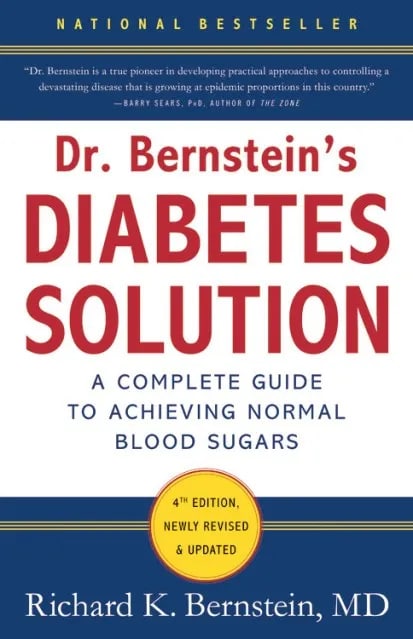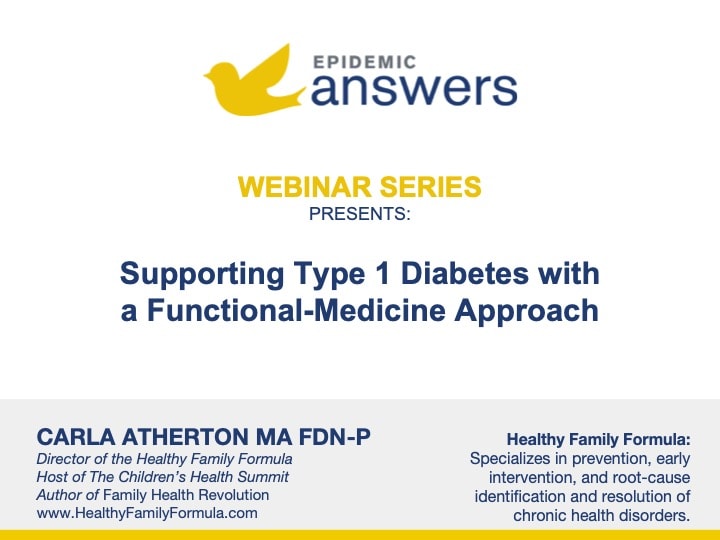Blood-sugar regulation problems don’t just apply to diabetics. Most chronic health conditions have an underlying root cause of inflammation, which means that undue strain is placed on the adrenal glands. These glands regulate inflammation, blood sugar, sleep cycles and stress response. Thus, uncontrolled and chronic inflammation can lead to dysregulated blood-sugar levels. In addition, conditions that have a dysregulated sensory component create constant stress that can place excess demands on the adrenal glands.
People with the following conditions are likely to have dysregulated blood-sugar levels that are often underrecognized by most healthcare practitioners:
Who Is Richard K. Bernstein MD?
Dr. Bernstein wrote Dr. Bernstein’s Diabetes Solution out of his frustration with battling established notions about diabetes treatment, which usually entails matching insulin dosages to the amount of carbohydrates consumed. He was diagnosed with type 1 diabetes in 1946 at the age of 12 in an era when there weren’t home glucose monitors and test strips.
By the age of 35, after following guidelines of the American Diabetes Association for more than 20 years, Dr. Bernstein had many of the debilitating complications of type 1 diabetes. He became one of the original biohackers when he bought a blood-glucose monitor, which was fairly new and expensive at the time. With his engineer’s mind, he tracked his blood-sugar levels as well as what he ate, whether he exercised, how much medication and insulin he took and so on. From these many data points, he discovered that severely restricting his carbohydrate consumption normalized his blood-sugar levels and significantly lowered the amount of insulin he needed. After following this approach for a few years, many of the symptoms that long-term diabetics often face disappeared.
He unsuccessfully tried for years to convince doctors and diabetes associations about his approach, but they wouldn’t listen. At the age of 45, he decided that if he couldn’t beat them, he’d join them and went to medical school. Doctors and associations began listening to him after he received his medical license and published a myriad of articles about the benefits to diabetics – even type 1 diabetics like himself – of a low-carbohydrate diet.
What’s in the Book?
Blood-Sugar and Hemoglobin A1C Levels
A lot of what Dr. Bernstein writes in this book may be somewhat shocking to most diabetics, endocrinologists and diabetes associations. His diabetes solution starts off with a shot across the bow that “normal” blood sugar is typically defined as between 60-120 mg/dl and sometimes even as high as 140 mg/dl. In fact, the American Diabetes Association recommends that “tight control” of blood sugars is achieved with levels between 90-130 mg/dl before meals and less than 180 mg/dl two hours after starting a meal with a hemoglobin A1C of less than 7%. Dr. Bernstein followed these recommendations for years and realized that they were not stringent enough for him and others.
Instead, from the mounds of clinical data that he has analyzed, he believes that the optimal blood sugar level is 83 mg/dl and shouldn’t go much higher than that, even after eating. Dr. Bernstein also writes that the optimal range of hemoglobin A1C is 4.2-4.6% (correlating to blood sugar of about 72-86 mg/dl), which is far below the 5.7% level that is considered normal.
Low-Carbohydrate Diet
To achieve this, he recommends a low-carbohydrate, virtually ketogenic diet with only 6-12 grams of carbohydrate per meal, for a total of about 30 grams per day, even for type 1 diabetics. He provides recipes and tips for reaching this goal and explains how keeping blood sugar in this tight range can reverse long-term diabetic complications such as kidney damage, gastroparesis and neuropathy. Covering carbohydrate consumption with injected insulin is a common misconception because injected insulin works differently than natural insulin created in the body.
Testing and Weight Lifting
He advocates for testing blood-glucose levels five times a day and keeping a food diary along with a record of medications, insulin, exercise, stress, sleep and other factors that affect blood sugar. He recommends exercise, especially anaerobic, muscle-building exercise such as weight lifting for type 2 or obese diabetics because “the buildup of muscle mass lowers insulin resistance and thereby facilitates both blood sugar control and weight loss.”
Everything But the Kitchen Sink
In the book, he answers almost every conceivable question one might have about establishing a treatment plan and overcoming specific obstacles, such as gastroparesis (hint: chewing sugar-free gum can help). Throughout the book, he discusses the use of specific supplements and medications.
This book provides an extremely thorough and easy-to-understand manual for implementing Dr. Bernstein’s diabetes solution. If one were able to buy only one book about diabetes, it should be this one because the odds are likely that other books will direct readers to achieve a “normal” range of blood sugars, rather than the optimal range that Dr. Bernstein recommends.
Richard K. Bernstein MD is one of the world’s foremost experts in diabetes treatment and care. He is the author of six books about diabetes, including The Diabetes Diet.
Dr. Bernstein is the emeritus director of the Peripheral Vascular Disease Clinic at Jacobi Medical Center, an instructor at New York Medical College, fellow of the American College of Nutrition, and as a consultant to the Department of Physical and Rehabilitation Medicine at Albert Einstein College of Medicine.
An attending physician at North Bronx Healthcare Network, he also maintains a private practice in Mamaroneck, NY, where he lives. You can find out more about him and his practice at diabetes-book.com

Still Looking for Answers?
Visit the Epidemic Answers Practitioner Directory to find a practitioner near you.
Join us inside our online membership community for parents, Healing Together, where you’ll find even more healing resources, expert guidance, and a community to support you every step of your child’s healing journey.
Sources & References
Accurso, A., et al. Dietary carbohydrate restriction in type 2 diabetes mellitus and metabolic syndrome: time for a critical appraisal. Nutr Metab (Lond). 2008 Apr 8:5:9.
Adebayo, O., et al. The changing face of diabetes in America. Emerg Med Clin North Am. 2014;32(2):319-27.
Bahr, L.S., et al. Ketogenic diet and fasting diet as Nutritional Approaches in Multiple Sclerosis (NAMS): protocol of a randomized controlled study. Trials. 2020 Jan 2;21(1):3.
Banerjee, S., et al. Ayurveda in changing scenario of diabetes management for developing safe and effective treatment choices for the future. J Complement Integr Med. 2015.
Bernstein, R.K. Blood glucose self-monitoring by diabetic patients: refinements of procedural technique. Diabetes Care. 1979 Mar-Apr;2(2):233-6.
Bernstein, R.K. Virtually continuous euglycemia for 5 yr in a labile juvenile-onset diabetic patient under noninvasive closed-loop control. Diabetes Care. 1980 Jan-Feb;3(1):140-3.
Bradford, B.L., et al. Mitochondrial Dysfunction and Type 2 Diabetes. Science. 2005 Jan 21;307(5708):384-7.
Brenton, J.N., et al. Phase II study of ketogenic diets in relapsing multiple sclerosis: safety, tolerability and potential clinical benefits. J Neurol Neurosurg Psychiatry. 2022 Jun;93(6):637-644.
Brenton, J.N., et al. Pilot study of a ketogenic diet in relapsing-remitting MS. Neurol Neuroimmunol Neuroinflamm. 2019 Apr 12;6(4):e565.
de la Rubia Orti, J.E., et al. Can Ketogenic Diet Improve Alzheimer’s Disease? Association With Anxiety, Depression, and Glutamate System. Front Nutr. 2021 Oct 27:8:744398.
de la Rubia Orti, J.E., et al. Exploring the impact of ketogenic diet on multiple sclerosis: obesity, anxiety, depression, and the glutamate system. Front Nutr. 2023 Aug 25:10:1227431.
Dietch, D.M., et al. Efficacy of low carbohydrate and ketogenic diets in treating mood and anxiety disorders: systematic review and implications for clinical practice. BJPsych Open. 2023 Apr 17;9(3):e70.
Feinman, R.K., et al. Dietary carbohydrate restriction as the first approach in diabetes management: critical review and evidence base. Nutrition. 2015 Jan;31(1):1-13.
Hao, J., et al. Mitochondrial nutrients improve immune dysfunction in the type 2 diabetic Goto-Kakizaki rats. J Cell Mol Med. 2009 Apr;13(4):701-11.
He, C., et al. Targeting gut microbiota as a possible therapy for diabetes. Nutr Res. 2015.
Hinzmann, R., et al. What do we need beyond hemoglobin A1c to get the complete picture of glycemia in people with diabetes? Int J Med Sci. 2012;9(8):665-81.
Irish, A.K., et al. Randomized control trial evaluation of a modified Paleolithic dietary intervention in the treatment of relapsing-remitting multiple sclerosis: a pilot study. Degener Neurol Neuromuscul Dis. 2017 Jan 4;7:1-18.
Karkafi, R.E., et al. Ketogenic Diet and Inflammation: Implications for Mood and Anxiety Disorders. Adv Exp Med Biol. 2023:1411:537-554.
Laron, Z. Interplay between heredity and environment in the recent explosion of type 1 childhood diabetes mellitus. Am J Med Genet. 2002;115(1):4-7.
Lennerz, B.S., et al. Management of Type 1 Diabetes With a Very Low-Carbohydrate Diet.
Pediatrics. 2018 Jun;141(6):e20173349.
Power, R.A., et al. Carnitine revisited: potential use as adjunctive treatment in diabetes. Diabetologia. 2007 Apr;50(4):824-32.
Rector, R.S., et al. Mitochondrial dysfunction precedes insulin resistance and hepatic steatosis and contributes to the natural history of non-alcoholic fatty liver disease in an obese rodent model. J Hepatol. 2010 May;52(5):727-36.
Smith, J., et al. Ketogenic diet restores aberrant cortical motor maps and excitation-to-inhibition imbalance in the BTBR mouse model of autism spectrum disorder. Behav Brain Res. 2016 May 1:304:67-70.
Tuomi, T., et al. The many faces of diabetes: a disease with increasing heterogeneity. Lancet. 2014;383(9922):1084-94.
Vaarala, O. Is the origin of type 1 diabetes in the gut? Immunol Cell Biol. 2012;90(3):271-6.
Vaarala, O. Gut microbiota and type 1 diabetes. Rev Diabet Stud. 2012;9(4):251-9.
Resources
Articles
Mayers, Dara. The nutrition advice given to most diabetics might be killing them. U.S. News Health & Medicine, July 2003.
Totty, Patrick. ADA’s Latest Low-Carb Stance Is Severely Flawed, Says Longtime Low-Carb Advocate Dr. Bernstein. Diabetes Health, 8 February 2008.
Books
Bernstein, Richard K. Dr. Bernstein’s Diabetes Solution: The Complete Guide to Achieving Normal Blood Sugars. Little, Brown Spark, 2011.
Wahls, Terry. The Wahls Protocol: A Radical New Way to Treat All Chronic Autoimmune Conditions Using Paleo Principles. Avery, 2020.
Wahls, Terry. The Wahls Protocol Cooking for Life: The Revolutionary Modern Paleo Plan to Treat All Chronic Autoimmune Conditions. Avery, 2017.




